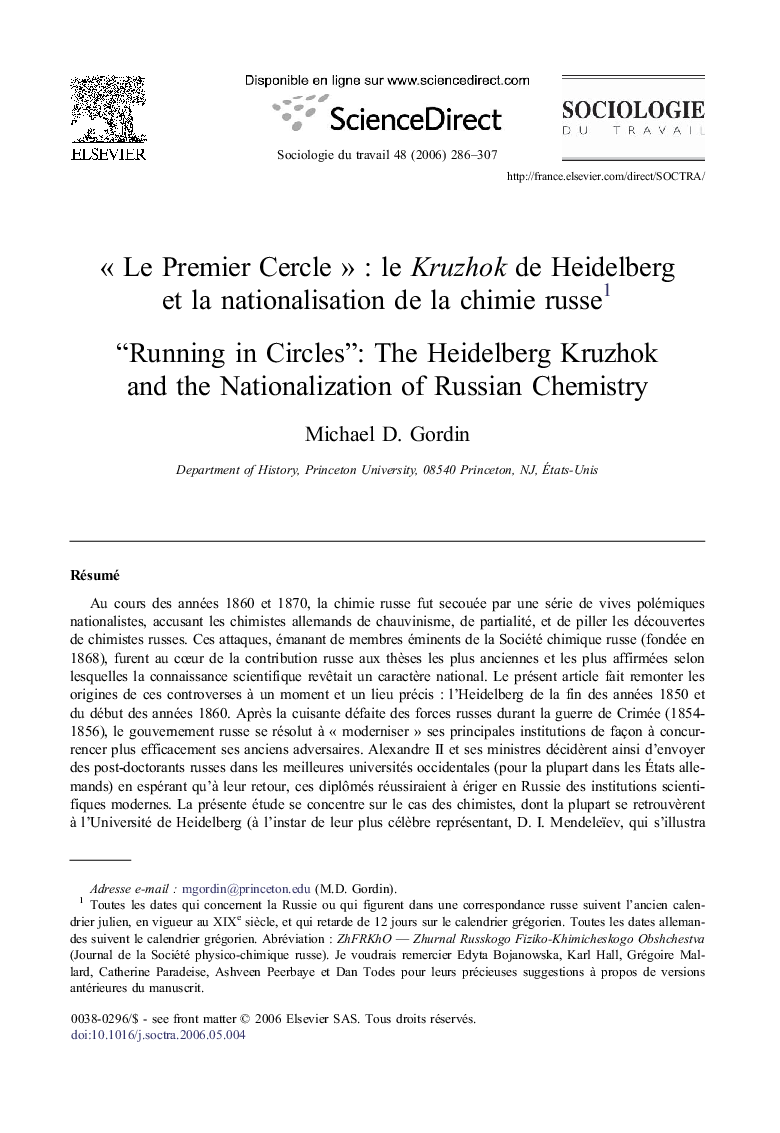| کد مقاله | کد نشریه | سال انتشار | مقاله انگلیسی | نسخه تمام متن |
|---|---|---|---|---|
| 1130696 | 955469 | 2006 | 22 صفحه PDF | دانلود رایگان |
عنوان انگلیسی مقاله ISI
« Le Premier Cercle » : le Kruzhok de Heidelberg et la nationalisation de la chimie russe1
دانلود مقاله + سفارش ترجمه
دانلود مقاله ISI انگلیسی
رایگان برای ایرانیان
کلمات کلیدی
موضوعات مرتبط
علوم انسانی و اجتماعی
علوم اجتماعی
جامعه شناسی و علوم سیاسی
پیش نمایش صفحه اول مقاله

چکیده انگلیسی
In the 1860s and 1870s, Russian chemistry was rocked by a series of charged nationalist polemics, alleging that German chemists had been engaged in jingoism, bias, and poaching the discoveries of Russian chemists. These salvos from leading members of the Russian Chemical Society (established 1868) formed the core of the Russian contribution to some of the earliest and clearest claims that natural knowledge revealed a national character. This paper traces the origins of these disputes to a specific location: Heidelberg in the late 1850s and early 1860s. After the humiliating defeat of Russian forces by a Western European coalition in the Crimean War (1854-1856), the Russian government resolved to “modernize” its major institutions to enable it to compete more effectively against its former opponents. Alexander II and his ministers decided to export Russian postdocs to leading Western universities (mostly in the German states) hoping that these graduates would be able to erect modern scientific institutions within Russia upon their return. This paper focuses on the chemists among them, most of whom ended up at Heidelberg University (including their most famous representative, D. I. Mendeleev, later renowned for his 1869 formulation of the periodic system of chemical elements). While there, they experienced profound alienation from their German peers, and retreated to their own environments - particularly the Russian urban institution of the kruzhok or “circle.” This kruzhok, formed as a reaction to perceived German xenophobia, was the major social institution upon which the Russians - once back in St. Petersburg - could construct a Russian Chemical Society and the basic institutions of Western scholarship. The supposed venture into Western Europe resulted not in a hegemonic submission to the institutions of German academia, but rather to a revitalization of a Russian cultural form that proved both adaptable to the demands of technical professionalization and became a kernel for a Germanophobic nationalism that would permeate the sciences in the ensuing decades. The paper concludes with an analysis of three different styles of scientific nationalism in chemistry: the representative, concerning the preferential employment of Russians over Germans in state institutions; the linguistic, about the proper national language(s) for science; and the internationalist, whereby Russians defended the cosmopolitan in science to attack perceived German jingoism.
ناشر
Database: Elsevier - ScienceDirect (ساینس دایرکت)
Journal: Sociologie du Travail - Volume 48, Issue 3, JulyâSeptember 2006, Pages 286-307
Journal: Sociologie du Travail - Volume 48, Issue 3, JulyâSeptember 2006, Pages 286-307
نویسندگان
Michael D. Gordin,